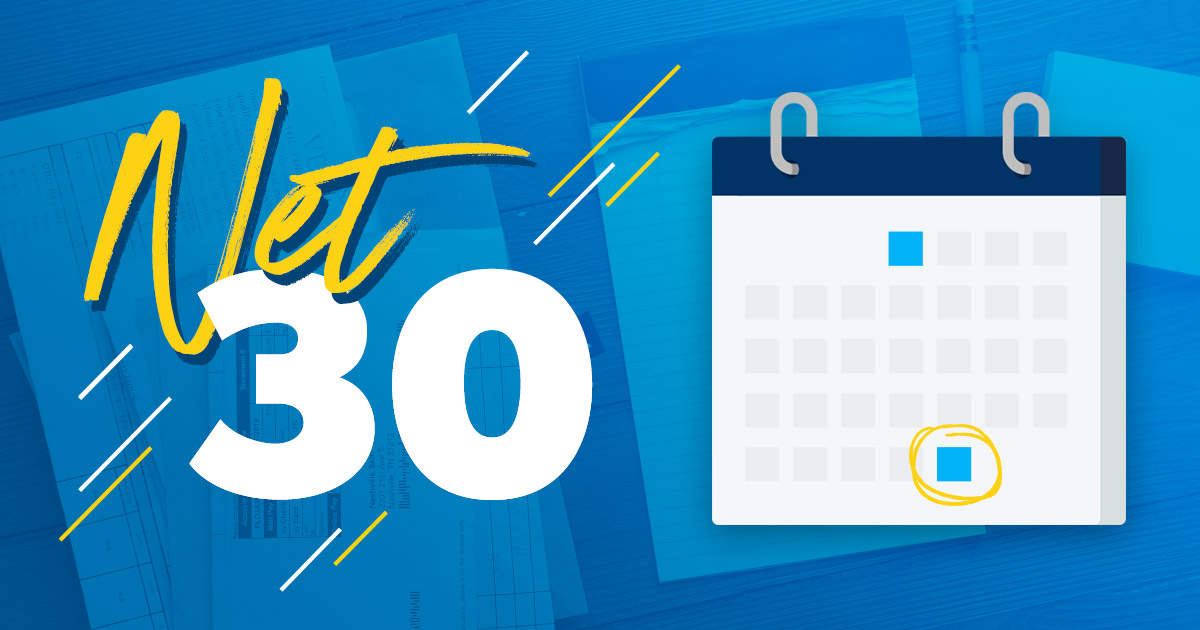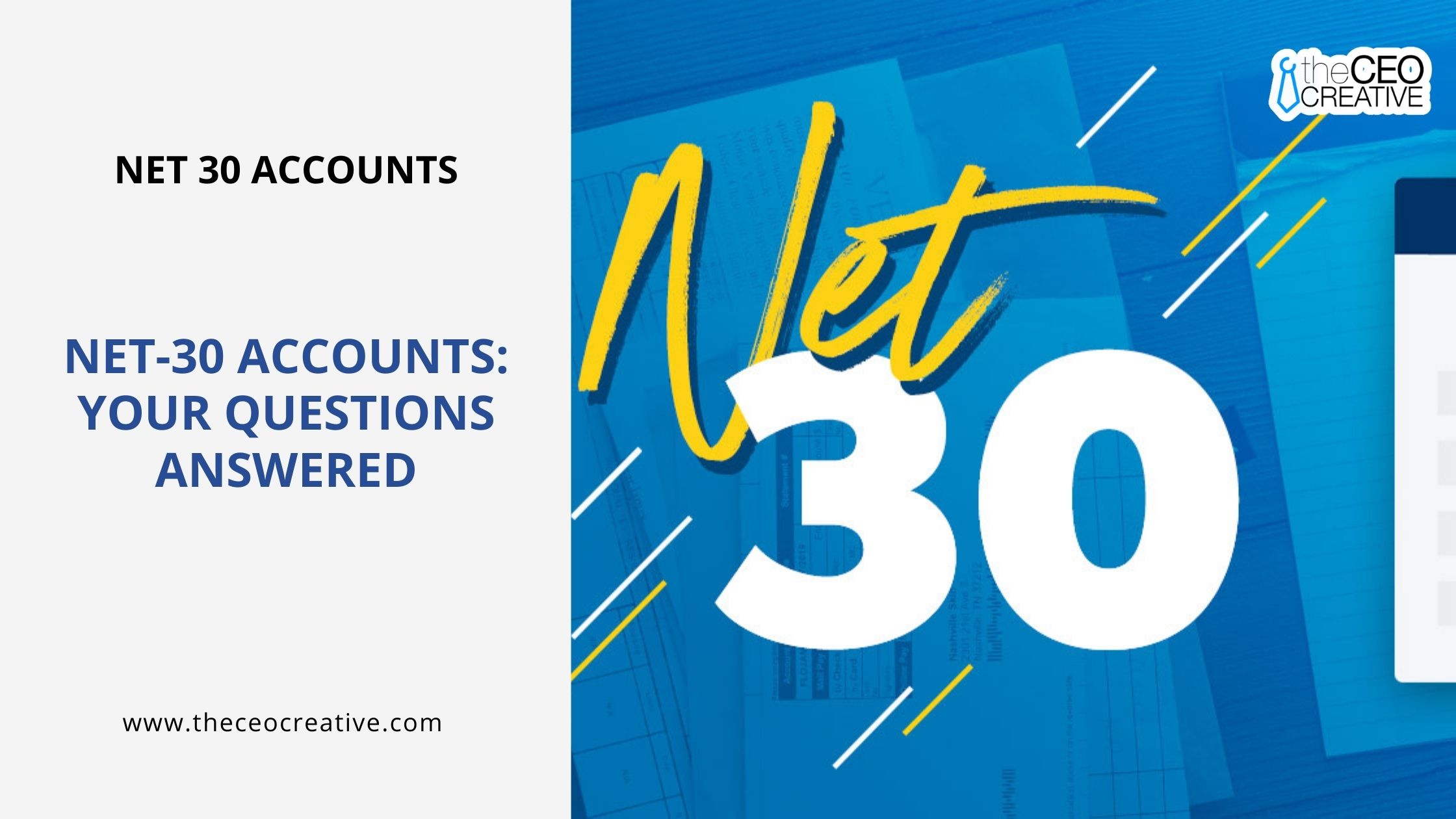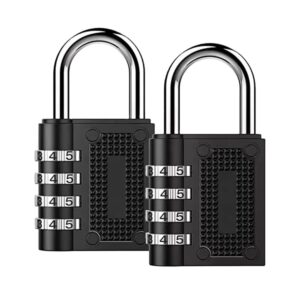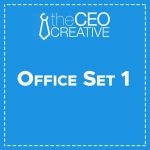Hi everyone, whether you’re just starting out or already running a business! Have you ever felt confused by all the different terms and deadlines when it comes to invoices and payments? Don’t worry, you’re not the only one! That’s when Net 30 accounts come to the rescue. But what are they, and how can they help you? Basically, they’re a way for businesses to handle their money better and get some extra credit. Let’s take a closer look at this helpful idea.
What Are Net 30 Accounts?

If you own a small business, you may have heard the term “Net 30 accounts” in the area of business finance. It’s important to know what these accounts are and how they can help your business. Let’s take a closer look to understand this key idea better.
Definition and Explanation
A Net 30 account is a type of payment agreement between businesses. It lets a buyer (your business) buy something from a seller (another business) and pay for it within 30 days. This gives businesses a little extra time before they need to pay their bills. The “net” means the full amount owed — there are no extra fees or interest as long as you pay within 30 days.
This setup is very useful for businesses that need time to earn money from their sales before paying suppliers. It’s especially helpful for newer businesses that might not have much money right away, giving them some extra time and flexibility to handle their finances.
How Net 30 Accounts Work
When you open a Net 30 account with a supplier, you get the products or services right away. The supplier sends you a bill with a due date 30 days later. During those 30 days, your business can use, sell, or work with the items to make money to pay the bill.
For example, think about a small clothing store that orders clothes from a supplier using a Net 30 account. The store gets the clothes and starts selling them right away, using some of the money from the sales to pay the bill by the due date. This way, the store keeps its stock, runs smoothly, and manages its money well without needing to pay upfront.
Common Myths About Net 30 Terms
There are several misconceptions about Net 30 accounts that might stop businesses from using them. Let’s clear up some of these misunderstandings:
– Myth 1: Net 30 accounts are only for big companies. This isn’t true. Small businesses can also qualify for and benefit from Net 30 terms. Many suppliers want to work with small businesses because they see the value in building long-term relationships.
– Myth 2: You can’t build business credit with Net 30 terms. Actually, using Net 30 accounts and paying on time helps improve your business credit score. Companies like Dun & Bradstreet monitor payment histories, and making timely payments can boost your business credit profile.
– Myth 3: Net 30 accounts don’t help with cash flow. When used properly, Net 30 accounts can significantly improve cash flow. They let businesses turn inventory into money before they have to pay the bill, making finances run more smoothly.
Understanding these facts can shed light on how valuable Net 30 accounts can be for your business operations.
Benefits of Net 30 Accounts for Businesses

Net 30 accounts offer several key advantages that are especially helpful for businesses that are expanding. Let’s look at how they can help your business succeed.
Improved Cash Flow Management
One of the main benefits of Net 30 accounts is how they help manage cash flow. For any business, it’s important to keep money moving smoothly, and Net-30 does just that. By allowing payments to be delayed for up to 30 days, businesses can use their money for immediate needs, such as paying employees or bills.
This delay works like a free loan, helping with better financial planning. It also means you don’t have to use savings or take out costly loans to pay suppliers right away. The extra flexibility this provides can greatly help with short-term cash flow issues.
Building Business Credit
For new businesses and small companies, having a good credit history is very important. Using Net 30 accounts carefully is an easy way to improve your business’s credit. Here’s how:
– Pay on Time: Always pay your suppliers on time. This shows up well on your credit report and helps others see that you are dependable and financially stable.
– Good Credit Score: A high credit score can lead to better financial options in the future, like loans and credit lines. If you have a history of paying on time with Net 30 accounts, your business looks more trustworthy and less risky, which can help you get better financial deals.
In short, managing Net 30 accounts well can help your business build better credit and become more financially independent.
Increased Purchasing Power
With the option to delay payments for 30 days, companies can increase their buying power without needing cash right away. This is especially helpful in situations where market conditions change quickly, and getting products quickly might be needed to take advantage of popular trends or special discounts for buying in large quantities.
– Flexible Buying: With Net 30 terms, businesses don’t have to limit their purchases based on their current cash. This can be very important in industries like retail, where having the latest inventory directly impacts sales.
– Chances for Growth: Using this buying power wisely can help businesses grow faster than they could with cash-on-delivery options. By getting the stock or materials needed for growth quickly, companies can meet higher demand without any delays.
This extra buying power helps keep daily activities running and also offers chances for growth and expansion that might be hard for small businesses with tight budgets to achieve.
Overall, Net 30 accounts are useful for handling money, building credit, and finding ways to grow. Using these accounts and understanding how they work can help your business do better. If you want to improve your financial plans, think about adding Net 30 accounts to your business. It could be the tool you need to help your business succeed.
How to Qualify for a Net 30 Account

If you’re interested in using Net 30 accounts, the first thing to do is learn how to get approved for them. These accounts are a great tool for businesses, particularly small ones, to manage their money better. However, the requirements for approval can differ depending on the supplier you choose. Here’s a simple guide to the key points you should understand.
Building a Strong Business Credit Profile
Your business credit profile is like a financial report card. Just like good grades can help you get into college or find a job, a strong credit profile can help your business have more options and chances to grow.
– Register Your Business: First, make sure your business is officially registered. Get a business license and follow any important rules or laws. This step is very important because it shows your business is real and trustworthy.
– Get an EIN: An Employer Identification Number, or EIN, is like a Social Security number for your business. You need it to open business accounts and file taxes.
– Open a Business Bank Account: It’s important to keep your personal and business money separate. A business bank account helps you keep good records and makes your company look more professional.
– Build Strong Financial Practices: Always pay your bills on time, keep your debts low, and show a steady financial history to your current lenders or creditors.
– Work with Credit Reporting Companies: Try to create a credit history with business credit agencies such as Dun & Bradstreet, Experian Business, and Equifax Business. You can begin by getting vendor credit, like Net 30 accounts, even for small amounts.
By following these basic steps, you’ll create a solid credit foundation that can make it easier to get Net 30 accounts in the future.
Meeting Vendor Requirements
When your business credit is strong, it’s time to focus on what each vendor needs. Every vendor has different rules, so doing your homework is important.
– Find the Right Vendors: Not all vendors are the same. Spend time finding businesses that offer Net 30 payment terms and match your industry or needs.
– Know What They Want: Understand what you need to apply. Usually, vendors ask for your business’s financial info, history, and credit references. Being ready with these can help you get approved faster.
– Look Professional: Make sure your business looks good. This means having a nice website, correct contact details, and a professional email address.
– Meet Minimum Order Amounts: Some sellers might ask for a minimum order to start a Net 30 account. Make sure your first orders meet this amount.
– Expect Possible Denial: If you’re new, some sellers might be unsure. Take this chance to ask questions, improve your request, and try again.
By researching and preparing well, you’ll increase your chances of getting a Net 30 account that fits your business.
How do Net 30 Accounts Affect my Business Credit?

After qualifying for a Net 30 account, it’s important to understand how it affects your business credit. Similar to other financial tools, Net 30 accounts can either improve or damage your credit depending on how you handle them. Let’s look at the positive and negative aspects.
Positive Impact of Timely Payments
Paying on time is very important for your business’s reputation. It shows that you are dependable and helps you build trust with lenders and suppliers. Here’s why paying on time is good for your business:
– Better Credit Rating: If you always pay on time, it shows you handle money well, which can improve your business’s credit score.
– Stronger Connections with Suppliers: When you pay your bills quickly, suppliers trust you more. This could lead to better deals, discounts, or the ability to buy more in the future.
– More Chances to Borrow Money: If you have a history of paying on time, banks and other lenders might be more likely to give you credit or loans with good terms.
– Better Cash Flow Control: Paying on time helps you plan and keep your money flow steady. This lets you use extra funds for growing your business.
– Stronger Position: A high credit score and good ties with suppliers can give you an edge when making deals or setting up new supplier accounts.
In short, paying your Net 30 bills on time is like saving for your business’s future success.
Negative Impact of Late Payments
Just like the sun can create a shadow, not handling your Net 30 accounts carefully can cause problems:
– Lower Credit Score: If you pay late, it gets reported to credit agencies and can lower your credit score. This can make it harder to get loans or credit in the future.
– Higher Costs: Some sellers might charge extra fees for late payments or increase interest rates, making your total costs go up.
– Bad Vendor Relationships: Building trust with vendors takes time, but it can be lost quickly. Late payments can damage these relationships, leading to worse terms or even losing the account.
– Fewer Credit Options: If you pay late often, it shows financial trouble, and lenders might be less willing to give you new credit or loans.
– Cash Flow Problem: Late fees and penalties from missing payment deadlines can make it harder to manage your money, making it even more difficult to pay your bills.
To prevent these issues, it’s important to plan your payments and make sure you have enough money before the due date. A few late payments might not seem like a big deal, but they can lead to bigger financial problems later on.
In the end, a Net 30 account can be a great tool for your business if you use it well. They help you build a good financial reputation and can greatly improve your chances of growing and succeeding. Treat them carefully, and they can create many opportunities.
What are The Best Net 30 Accounts for Small Businesses?

Understanding Net 30 accounts can be challenging, especially when you’re new to them or trying to improve your business practices. These accounts can significantly boost your cash flow and help build your business credit, but it’s important to choose the right ones. Here’s a guide to help you find the best Net 30 accounts for your small business
Factors to Consider When Choosing an Account
Not all Net 30 accounts are the same, and what works for one business may not work for another. Here are some things to think about when picking the right account for your business:
– Credit Bureau Reporting: A big advantage of Net 30 accounts is that they help build your business credit. Make sure the vendor reports to at least one of the main business credit bureaus, like Dun & Bradstreet, Equifax, or Experian Business. This helps you build a strong credit history over time.
– Vendor Reputation: Working with trusted vendors can save you a lot of trouble. Look for reviews and feedback from other businesses to see how reliable and good their service is.
– Matching Products and Services: Choose vendors whose products and services fit what your business needs. For example, if you run an office, a vendor that offers office supplies on a Net 30 basis might be more useful than one that provides industrial materials.
– Flexible Payment Options: See if the vendor allows changes to payment plans and has a history of being adaptable in tough situations. This can be very helpful if your money flow gets low for a short time.
– Minimum Order Amounts: Some vendors require a minimum order amount for Net 30 payment terms. Make sure your business can always meet this to prevent fees or account issues.
Examples of Popular Net 30 Accounts
Here are a few popular Net 30 accounts that small businesses frequently use:
1. The CEO Creative: A reputable supplier known for its wide array of shipping and office supplies. The CEO Creative is popular among small businesses due to its excellent credit reporting and customer service.
2. Quill: An office supply store with a full range of products, from toner to coffee. They report to Dun & Bradstreet, which makes them a top choice for businesses trying to improve their credit.
3. Crown Office Supplies: Despite the name, they offer more than just office supplies. Crown reports to several credit bureaus and is often suggested for new entrepreneurs building their business credit.
4. Creative Analytics: A marketing agency that provides Net 30 payment terms for its digital services and reports to business credit bureaus. They are a good option for businesses looking for help with their growth plans.
These accounts not only give you the supplies you need but also help create a strong credit history, which is very important for the long-term success of your business.
How Can I Manage My Cash Flow with Net 30 Accounts?

Using Net 30 accounts to understand and control your cash flow is important for keeping your business stable and growing. These accounts give you a little extra time to pay, but it’s very important to use this extra time wisely.
Strategies for Effective Cash Flow Management
Here are some ways to keep your money coming in strong:
– Send Invoices Quickly: Make sure you send invoices right away and check on unpaid ones often. This helps keep your money coming in regularly and lets you keep the payment terms you agreed on with your suppliers.
– Watch Your Spending: Pay close attention to your expenses and change them if needed. Reducing unnecessary spending can give you more money for important investments or to cover any shortfalls.
– Talk About Payment Terms: Sometimes suppliers might agree to give you more time to pay, especially if you always pay on time. Don’t be afraid to ask for terms that work better for your situation if you need to.
– Create an Emergency Fund: Save some of your income, preferably in a different account, to cover unexpected costs without affecting your business.
– Use Automation and Reminders: Set up automatic payments and reminders for key financial dates. This helps avoid late fees and keeps your accounts in good condition.
Tools and Resources for Tracking Finances
Using up-to-date financial tools can completely change how you handle your money and keep track of all your financial activities:
– Accounting Programs: Tools like QuickBooks, Xero, or FreshBooks give you instant updates on your finances. They can help you manage invoices, bills, and show you how your money is moving.
– Spreadsheets and Cash Flow Trackers: If you’re trying to save money, basic tools like Google Sheets or Excel can help you track your cash flow by hand. There are many free templates online to help you get started.
– Financial Apps: Apps like Mint or PocketGuard make it simple to check your income and expenses anytime. They give you a quick look at where your money is being spent and help you stay within your budget.
– Get Help from a Financial Expert: As your business expands, having a professional regularly check your finances can provide useful advice and ideas, which might help you find ways to save money or suggest the best way to use Net 30 accounts.
Using the right tools and methods to manage your money helps you pay your suppliers on time and keeps your business in good shape. By keeping an eye on your finances and using Net 30 accounts wisely, you can improve both your daily operations and future growth.
Conclusion
To sum up, Net 30 accounts can be very helpful for small businesses that want to manage their money better and build strong business credit. These accounts let businesses handle their money in and out more easily by offering flexible payment options.
– They help build good relationships with suppliers.
– They give businesses time to pay for immediate costs while waiting for customers to pay.
So, if you’re looking for ways to improve your business’s finances, think about using Net 30 accounts in your payment plans. They not only help your business run smoothly but also prepare you for future chances to borrow money.
Frequently Asked Questions
Are Net 30 accounts safe for new or small businesses?
Yes, Net 30 accounts are commonly used by startups and small businesses. When managed properly, they help control cash flow without interest. The key is to spend only what you can repay within 30 days.
Can Net 30 accounts affect your business credit score?
Late or missed payments may be reported to credit bureaus and impact your credit score. When managed properly, Net 30 accounts support positive credit growth.
What documents are usually required to apply for Net 30 accounts?
Most vendors ask for basic business details like your EIN, business address, and contact information. Some may also request trade references or a business bank account. Requirements vary by vendor.
How long should a business use Net 30 accounts before applying for other credit?
Many businesses see credit benefits within a few months of consistent on-time payments. Building a solid payment history first improves approval chances. Net 30 accounts often act as a stepping stone to larger credit options.








